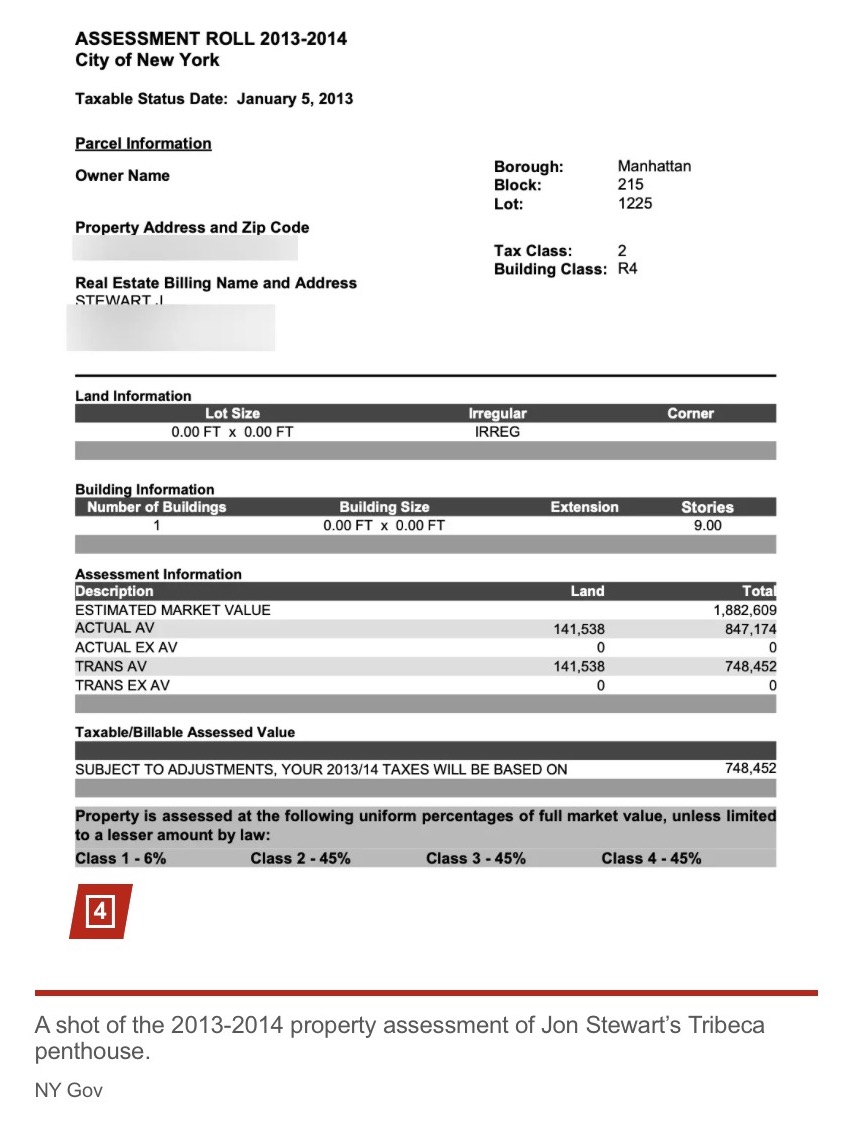NY Post Promotes Laughably Wrong Claim From Online Troll Accusing Jon Stewart of Fraudulently Overvaluing His Apartment

Photo by Victoria Will/Invision/AP, File
The New York Post made the curious decision to promote Tim Pool’s laughably false accusation that Jon Stewart committed some sort of fraud regarding the 2014 sale of his Manhattan penthouse, amplifying the notorious right-wing troll’s claim to the point where Stewart’s name trended on X, formerly Twitter.
The kerfuffle arose from Stewart’s comments on Monday’s episode of The Daily Show, in which he blasted commentators who defended former President Donald Trump in the wake of his $454 million NY civil fraud judgment, seeming particularly incensed at Shark Tank’s Kevin O’Leary for claiming Trump’s overvaluations were “victimless.” Stewart excoriated O’Leary for his “f*cking entitled arrogance” and played clips of him getting mad at entrepreneurs on Shark Tank who overvalued their businesses.
Pool tweeted two screenshots in a post on Tuesday: the headline from a Nov. 7, 2014 article in The New York Times about the $17.5 million sale of Stewart’s “sophisticated penthouse at 161 Hudson Street, configured as a duplex loft with 2,000 square feet of outdoor options and nearly 6,000 square feet of interior space;” and an image that appeared to be from the New York property appraiser’s records.
“Did [Stewart] commit fraud when he sold his penthouse for $17.5M? NY listed its market value at $1.8M [and assessed value] at around 800k,” wrote Pool, before adding some apparent concern trolling asking whom did Stewart “defraud??” and claiming that he was “SHOCKED.”
The Post breathlessly picked up this tweet in an article by Mary K. Jacob labeled as a “REAL ESTATE EXCLUSIVE” and headlined “Jon Stewart found to have overvalued his NYC home by 829% after slamming Trump’s civil case as ‘not victimless.'”
“Jon Stewart is facing online backlash after the comedian opined on air this week that Donald Trump’s civil real estate case overvaluing his properties was ‘not victimless’ — when it turns out the price of a previous home sale finds Stewart doing the exact same thing, The Post has learned,” wrote Jacob. “[I]t didn’t take long for internet sleuths to look into Stewart’s own property history, where it shows an overvaluation of his New York City penthouse by a staggering 829%, records confirmed by The Post show.”
Sigh.
In no way was this the “exact same thing.” It is simply not accurate to say Stewart “overvalued” his property “by a staggering 829%.”
What’s happening here is Pool, Jacob, and other critics attacking Stewart are conflating three different types of real estate values. Whether that’s being done through an innocent mistake or a deliberate effort to spread misinformation, we’ll leave it to the reader to decide, but they’re confusing 1) the actual market value of a property, or what someone would be willing to pay for it, 2) the property’s taxable value as assessed by a governmental agency property appraiser, and 3) documentation about a property’s value submitted to a lender for the purposes of securing a loan.
Trump got in trouble for committing fraud regarding that third category, the information the Trump Org submitted to lenders to secure loans. Among the misrepresentations, perhaps the most egregious was the “tripling of the size of the Trump Tower Penthouse,” which Judge Arthur Engoron noted in his scathing ruling was an undeniable and indefensible falsehood.
To clarify one point, at multiple times during the legal proceedings the Palm Beach County (Florida) Property Appraiser’s 2011 assessed value for Mar-a-Lago of $18 million was brought up as a reference point in the back-and-forth arguments over whether Trump had overvalued that property, but Engoron did not represent or accept that property appraiser number as the actual market value, or come up with that number himself.
There have been a lot of misrepresentations about this “$18 million” valuation of Mar-a-Lago that can be clarified by reading Engoron’s actual ruling. It is absolutely critical to note that Mar-a-Lago is under a permanent deed restriction Trump signed in 1995 that requires it to be open as a social club and not reserved solely as a private residence. The deed restriction was followed by a 2002 conservation easement to the National Trust for Historic Preservation agreeing to preserve the property due to its historic nature and not subdivide it or develop further, resulting in Trump paying “significantly lower property taxes” over the years.
This has two main consequences: 1) it significantly reduces the market value of the property and 2) results in the property appraiser taxing the property as commercial and basing its valuation on the income the property can generate rather than taxing it as residential and basing its valuation on a potential sale price. Several excerpts from Engoron’s ruling below highlight these issues (citations omitted):
Page 25: McConney testified that for every SFC, Donald Trump valued Mar-a-Lago as if it were a private residence and not a social club, despite knowing that “Mar-a-Lago is a social club.” When asked the reason for his doing so, he testified: “I don’t remember off the top of my head.”
Page 33: When questioned about his knowledge and involvement in valuing Mar-a-Lago, Eric Trump adamantly maintained that it was appropriate to value Mar-a-Lago as a private residence, even though it was being taxed as a commercial club and the deed prohibited, in perpetuity, use of it as anything other than a social club.
Pages 35-36: When examined about the valuation of Mar-a-Lago, Donald Trump did not recall having any specific conversations with Weisselberg or McConney about valuing it as a private residence, although he conceded that it was valued on the SFCs as if it could be sold as a private residence.
When confronted with the 2002 deed in which he signed away, in perpetuity, the right to use or develop Mar-a-Lago as anything other than as a social club, in exchange for a conservation easement tax benefit, he offered that “when you say, ‘intend,’ intend doesn’t mean we will do it.”
Nonetheless, Donald Trump insisted that he believed Mar-a-Lago is worth “between a billion and a billion five” today, which would require not only valuing it as a private residence, which the deed prohibits, but as more than the most expensive private residence listed in the country by approximately 400%.
Page 41: In 2020, the Trump Organization hired Poer to file an appeal of the 2020 tax assessment of Mar- a-Lago, claiming that the assessed, taxed value of $26.6 million was too high. As part of the appeal, the Trump Organization explicitly stated that the property was commercial, and not residential. Two months after filing the appeal, the Trump Organization withdrew it, stating that it agreed with the $26.6 million determination of value. Flores conceded that that “determination was based on Mar-a- Lago being categorized as a commercial property.”
When presented with additional emails and documents found in Flores’ possession that unquestionably reveal that he absolutely understood that Mar-a-Lago was exclusively a commercial, not residential, property, Flores continued to deny any recollection, stating “[t]hat’s what the email says. I don’t recall.” Notwithstanding, every SFC from 2011-2021 valued Mar-a-Lago not only as if it could be sold as a private residence, but also as if there were no deed restrictions burdening it; the SFCs’ values for that decade range from $405 million to $739 million.
Page 67: McConney had in his possession, since at least 2011, a copy of the 2002 Deed, restricting the use of Mar-a-Lago as a single-family residence. McConney was also aware, when he prepared the SFCs supporting data, that the entire basis of the valuations of Mar-a-Lago rested on the premise that it could be sold as a private residence to an individual. Each and every year, he valued Mar-a-Lago as if it could be sold as a single-family residence, notwithstanding the deeded prohibitions against such use in perpetuity.
Further, when Patrick Birney took over for McConney in preparing the valuations for the SFCs, Weisselberg and McConney both concealed from Birney the 1995 and 2002 deeds. When valuing Mar-a-Lago on the SFCs from 2016-2021, McConney and Weisselberg selected comparables for Birney to use that were exclusively for private residences.
There is no legal gray area surrounding the permanent nature of the deed restrictions.
Accordingly, there can be no mistake that Donald Trump’s valuation of Mar-a-Lago from 2011- 2021 was fraudulent.
If Trump had listed Mar-a-Lago for sale on the public market for whatever price he dreamed it was worth, whether or not a buyer agreed to buy it for that price, that would not have been fraud; it’s the misrepresentations to lenders that got the Trump Org in trouble.
Back to the main point here: it’s incredibly common for there to be a vast disparity between a property appraiser’s assessed value and the actual real world market value for residential real estate across the country — plus multiple limitations under state law on how the government can value your property.
As an example, I bought a condo in Orlando, Florida last year and the information on the county property appraiser’s website lists a “market value” of roughly 84% and an “assessed value” of about 25% of what I paid. The public records show a similar gap between the previous owner’s purchase price and the property appraiser’s valuation. I also benefit from Florida’s homestead exemption and “Save Our Homes” law reducing the taxable value for residential property claimed as homestead and limiting how much a county property appraiser can increase my home’s assessed value every year. Further public record searches show multiple sales of other units in my condo association over the past few years with similar gaps between the county property appraiser’s assessed value and the actual sales prices of those condos.
Stewart’s condo in a trendy Tribeca neighborhood with deluxe accommodations that attracted other celebrity residents is, umm, quite a bit more posh and more than five times larger than my “fixer-upper,” but New York law granted him similar types of property tax breaks, and the property appraiser’s assessed valuation was both a public record accessible to the buyer and a number over which Stewart had no control.
The New York State Department of Taxation and Finance website has several explanatory pages on property taxes, showing how property taxes are calculated, listing various exemptions, how property values are assessed, and also the “Equalization Rate,” which can further limit the assessed value of a property.
As the screenshot of the New York property appraiser’s website information that the Post included in the article showed, in 2013 Stewart’s condo was in “Tax Class 2,” which gets the Equalization Rate of 45%.

Screenshot via The New York Post.
Perhaps the most ludicrous part of this whole article is that an NYC-based real estate reporter is apparently pretending a 6,000 square foot penthouse in Tribeca isn’t fairly sold for millions of dollars. Searching the Post’s own archives finds a Nov. 2014 article reporting that Stewart bought the condo in 2005 for $4.5 million. Selling that same property almost a decade later for $17.5 million isn’t outlandish for the Manhattan real estate market, and Jacob’s article included a YouTube realtor video with a tour of the spacious property. The video is from 2021, so presumably includes some renovations or upgrades since Stewart owned it, but the penthouse’s layout, massive size, and panoramic views wouldn’t have changed.
The Post does mount a half-hearted complaint on behalf of Stewart’s buyer, financier Parag Pande, who sold the condo for “a nearly 26% loss” in 2021. Besides the fact that this is when the city was climbing back from the pandemic, it still doesn’t justify the accusation that Stewart inflated the value by a “staggering 829%” or anything close to that. And even the article at real estate news website The Real Deal that Jacob links regarding Pande’s purchase notes multiple reasons for the reduced price besides the pandemic, including a lack of luxury amenities (full-time doorman, pool/sauna, gym, etc.) that buyers at that price point were now expecting and the fact that Pande hadn’t renovated since buying the condo, with the listing broker quoted as saying that “pretty much everyone” who looked at the unit “said they would do a lot of renovation work.”
Current real estate values in the area further drive home the point. Another 6,000 sq. ft. Tribeca penthouse not too far from the one Stewart owned is currently on the market for $24,450,000 (and has some absolutely lovely “chevron wood floors” and “a freestanding soaking tub facing the Empire State Building,” among other stunning views of the NYC skyline). Past sales in Stewart’s specific building show even the units that were half the size of his (and not on the penthouse level) still selling for millions of dollars.
A 6,000 sq. ft. Manhattan condo being listed for only $800,000 at any point during this past decade seems as likely as getting a visit from Santa Claus, the Tooth Fairy, and Bigfoot all in one afternoon, but this scurrilous attack was never about actual real estate reality; it seems the temptation to hurl the “hypocrite!” label at a Trump critic was too much to resist.
Stewart himself responded to the story with his typical sarcastic humor in a tweet Wednesday evening.
“OMG!! I’ve been caught doing something not remotely similar to Trump!” wrote Stewart. “I guess all I need to do now is start a fraud college, steal classified docs, bankrupt casinos, pay hush money, grab pussies, discriminate in housing, cheat at golf and foment insurrection and you’ll revere me!”
This article has been updated with additional information.
This is an opinion piece. The views expressed in this article are those of just the author.






